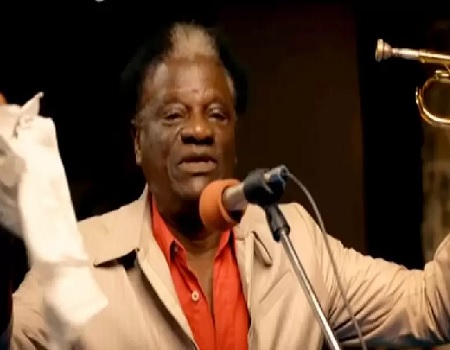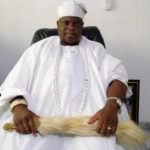The sun sets on the eventful life of Nigerian trumpeter, song star, song writer, Pan-Africanist, hotelier and entertainer, Victor Abimbola Olaiya popularly known as Dr. Victor Olaiya on February 12, 2020. Olaiya became renowned through his musical dexterity or ingenuity. He sang a genre of music called Highlife. The term reflects the early attitude of people who viewed it as a highbrow of social music. This is because, its early patron included the returnees from Sierra-Leone, Brazil, Cuba, European merchants and administrators and Western educated elite. The origin of Highlife is shrouded in controversy. It is believed to be imported to West Africa by the expatriates, especially returnee slaves from Liberia and Sierra Leone. However, to some others, it has its origin in traditional local music sung by local musicians in various ethnic group in West Africa and southern Nigeria in particular. It was developed in Nigeria around 1900 by indigenes that combined traditional music with Afro-American music, which was believed to be a result of the influence of Brazilian repatriates and ship crews from oversees. Ambrose Campbell, one of the pioneers in Nigeria explained this better “some of the songs which the crews (Liberian, Sierra Leonians and others) brought from their country, we mixed it in Yoruba and then we exchange songs, we sung our own song and they sung their own song”. Basically, the genre developed from ethnically based recreation music but borrowed largely from the various dance forms practiced by Brazilian and Cuban expatriates, its forerunners which existed in the cities and countryside are Abalabi, Kokoma, Agidigbo, that is Ghanaian Highlife, Faaji sung by Fatai Rolling Dollar, Kusimilaya by Adeolu Akisanya, and Achico sung by Orlando Owoh. These were bands that used some percussion instrument and guitars. Later, Western instruments like trumpets, accordions, saxophones, and other electronic gadgets were added. Pioneering musicians who started the genre in the early 1920s included Irewole Denge, Togo Lawson, Tunde King, Ayinde Bakare, Ambrose Campbell among others. However, transition of Highlife to a more acceptable and popular music could be attributed to the efforts of Emmanuel Tete, Mensah, a Ghanaian who was frequent Nigerian then and Bobby Benson. Benson’s album released in 1951 titled Taxi Driver epitomized the transformation.
Olaiya was born in Calabar on October 31, 1931 to Ijesha Isu Ekiti parents. His father was a church organist and chorister, while his mother was a folk singer. Family traits can be said to be a contributory factor to Olaiya musical ingenuity. Olaiya began to learn the ropes in 1946 with the Lagos Street Band. He later switched to Sam Akpabot’s Lagos City Orchestra before joining Humming Bees Orchestra also in Lagos. In the Humming Bees Orchestra were Highlife legends like ABC Cole, Mallam Bala Miller, Chris Ajilo and a certain Dennis. It was this musical group that was later rechristened Victor Olaiya and the Star Band. Its first album released in 1954 was titled Kusimilaya. His lyrics addressed themselves to the exposition and solution to the ills in the society, promotion of Unity in Africa, promotion of societal value and at times he dabbles into government policies especially in the 1980s when Austerity Measure brought untold hardship on the populace with the production of Ilu Le (Country hard). Nonetheless, he also was not left out of lewd songs to make his music comports to societal demands, for example Mo fe Mun Yan.
ALSO READ: Husband Cheats On Wife, Catches Coronavirus From Lover
Beyond this however, Olaiya was an entertainer per excellence and it in this area that he contributed his quota to nation building process in Nigeria even before independence. As a matter of fact, pre-colonial Nigerian leaders and public servants had ears for good music and were socialized. The prosperity of Nigeria at that time gave room for entertainment. Olaiya was therefore one of the darlings of Lagos Socialites and his ingenuity was recognized by the government which selected him as the band for state banquets. Remarkably, he along with J.O. Araba and Fatai Rolling Dollar entertained Queen Elizabeth II at Race Course now Tafa Balewa square Lagos during her visit to Nigeria in 1956. He equally played at Nigeria’s mis-independence zonal competition at sixteen centers and at the grand finale in Lagos in 1959, run-up to Nigeria independence in 1960. At independence celebration, Victor Olaiya, Ambrose Campbell among others entertained dignitaries and he was performing at National Independence celebrations since 1960. In 1962 during the Congolese war, he was contracted by Nigerian government to entertain Nigerian contingent to the UN peace keeping force in that country. He equally represented Nigeria at the First International Jazz Festival in Praque the capital of former Yugoslavia where he was awarded a honorary doctorate degree for his spectacular performance. We should recollect that during the Nigeria Civil War between 1967 and 1970, Olaiya, Cardinal Rex Lawson and Orlando Owoh entertained wounded soldiers on the Nigerian side. Furthermore, Olaiya and King Sunny Ade entertained former US president Bill Clinton, during his visit to Nigeria at Abuja in 2000 and Queen Elizabeth II and other dignitaries during the Commonwealth Head of Government meeting in Abuja in December 2003.
Olaiya’s musical dexterity and his role in nation building were recognized by the government of Chief Olusegun Obasanjo which honoured him with the national award of Officer of the Order of the Niger (OON) in 2001. Olaiya however, fumed at the award which he thought was either belated or inadequate for him when crooks but agents of the state were given higher awards. In his words “judging by what is obtained here, I don’t think Nigeria has the word merit in her dictionary, it is totally absent. Nobody can predict what can happen to him or her in Nigeria, so I think as an individual, you should do your best and leave the rest to providence”. Future is pregnant for Highlife genre due to depletion in the ranks of its practitioner. Last among the titans are Septuagenarians like Victor Uwaifo, Orlando Julius, Chris Ajilo and Young Ade Wesco who are no more visible. Will the genre go into extinction with the death of Olaiya? The answer is no. There are copycats who remixed the songs of Highlife legends and those who sing the song out rightly. However, Olaiya has trained one of his sons Bayode, the intricate of his music. The extent he holds the stairs will determine the future of the genre, may the soul of the icon rest in peace.
Adewuyi Adegbite
ayekooto05@gmail.com






